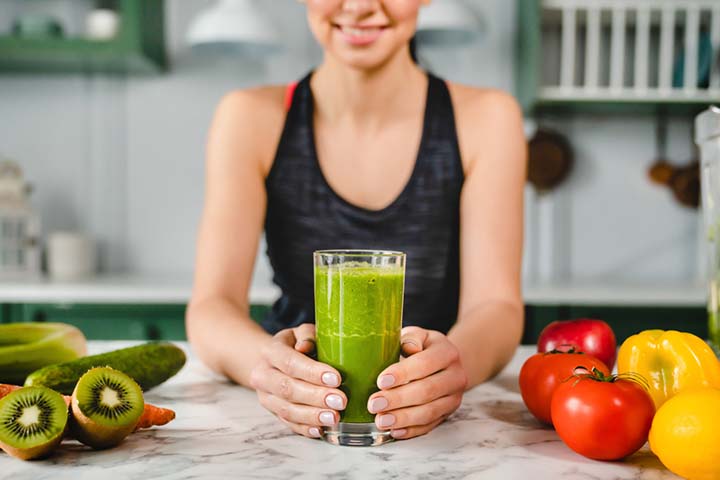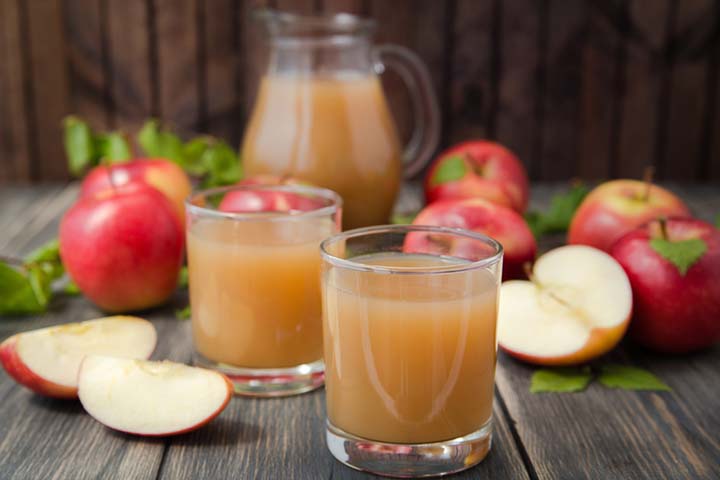Apples are a popular and nutritious fruit. When consuming apple juice while breastfeeding, you should ensure it is freshly extracted and unsweetened. Lactating women need more fluid and calories than non-lactating women. For sufficient breast milk production and nutrients, nursing mothers should consume healthy foods along with plenty of fluids. Along with water, fruit juices can help meet their daily fluid requirement.
However, it may be more beneficial to consume the fruit on its own to get the raw goodness of vitamins, folate, calcium, Vitamin C, and iron. The fruit may also serve as a tasty weight-loss snack.
Read this post to learn about the benefits of apples for maternal nutrition and whether apple juice is good for breastfeeding mothers.
Benefits Of Apples For Breastfeeding Women
Apple is a good source of calcium, iron, folate, and vitamins A and C. As a breastfeeding mom, you need a good supply of all these nutrients. A lack of calcium leads to weak bones and low milk production, as it is a major part of breast milk. At the time of lactation, you need to strengthen your body with iron-rich foods as well since your iron levels decrease during pregnancy (1).
Apple is also a good source of fiber, potassium, and phosphorus. A medium apple contains 80 calories, and is an excellent food if you are looking to eat healthily and shed extra weight (2).
Fluid Requirement While Breastfeeding
Since your water requirement increases during breastfeeding, you should increase your liquid intake through water, milk, and fruit juices. However, it is better to consume fruits rather than fruit juices as whole fruits contain the necessary dietary fiber for good digestive health. When you drink juice, it is best to limit the intake to 150 ml (3). Ensure that the juice is fresh and unsweetened. Extra sugar does nothing good for the body, and breastfeeding women need to be aware of what they eat for their good health as well their baby’s health.
Apple Juice While Breastfeeding
As a breastfeeding mom, you can safely drink apple juice on a regular basis. But it is still a better idea for lactating women to add whole apples rather than apple juice into their postpartum diet. With whole apples, women can also get fiber, which is lacking in juice (4).
The following tips on apple juice consumption while nursing may help you stay healthy:
- Continue to drink apple juice if it causes no discomfort to your baby. If your baby is fussy or sick after feeding, check your diet to see if apples may be causing the problem. Even though an apple is a safe food to eat during pregnancy and breastfeeding, some infants may show an adverse reaction to it. The baby’s stomach lining and digestive tract are still developing so they may not always react well to foods that are safe for women to consume during breastfeeding.
- Keep apple juice consumption to a minimum and try to include whole apples to your diet to get all nutrients and fiber.
- You may try homemade, fresh apple juice without artificial sweeteners and preservatives than commercially available apple juices.
Fruits provide excellent snacking options during pregnancy and breastfeeding. Apples come in several sweet, tart, or crunchy varieties and contain vitamins, folate, iron, and calcium. Apple juice can help meet your increased nutritional and hydration demands when breastfeeding. However, it is better to consume freshly extracted juice as the packaged ones may contain added sugars and preservatives that may be harmful to your baby. Apple juice is considered safe for breastfed babies, but it would be best to check with your doctor if they show signs of discomfort.
Key Pointers
- Breastfeeding women can safely consume freshly prepared and unsweetened apple juice.
- Apples are a rich source of vitamins, iron, calcium, and folate.
- Women are advised to choose whole apples over apple juice as the former contains more fiber.
- Consuming store-bought or packaged apple juice might lead to unwanted sugar consumption.
- However, maternal apple juice consumption may cause an adverse reaction in some nursing infants.













